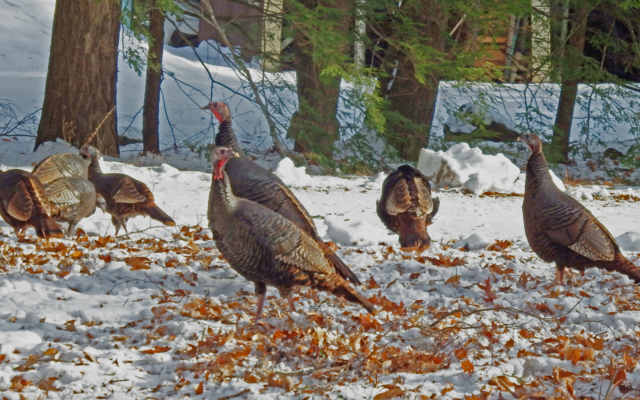
Last year’s wet summer means fewer adolescent wild turkeys
By Julie Harris, Bangor Daily News Staff
The wet weather last year during nesting and brood rearing means hunters will see fewer immature turkeys this year and adults next, but there should be plenty to hunt when the season opens on April 29, according to the state’s bird biologist.
The rains in late spring and throughout the summer in 2023 resulted in a higher than normal mortality rate of turkey eggs and poults or chicks, making it one of the lowest producing reproductive seasons on record, said Kelsey Sullivan, bird biologist for the Maine Department of Inland fisheries and Wildlife, on April 9.
But the true effect of those rains won’t be noticed by hunters until 2025, when the lower numbers of jakes and jennies — adolescent males and females — running around this year will be full-grown toms and hens and the targets of the spring and fall hunting seasons. Turkeys mature on a two-year cycle.
“We need a normal year to rebound, but we’re not in a crisis mode,†Sullivan said. “We won’t worry unless we have three or four bad years in a row. Turkeys rebound quickly.â€
There were a few pockets of normal reproduction last year, such as inland Down East along Route 1, but many areas were inundated by rain, he said.
This spring, turkeys will start to move around more as forests and fields thaw out. Usually hens can be seen in more abundance by mid-April and are sitting on their nests by the end of the month, Sullivan said.
Biologists have been studying turkey habits and banded some birds as part of it. Some of those turkeys have been reported as road kill, while others have fallen prey to coyotes and bobcats.The department is evaluating its data to figure out how to manage wild turkeys for the future.
With the increased concerns about avian flu in birds and mammals, Sullivan said turkeys are less likely to come in contact with the disease because they usually don’t intermingle with wild ducks.
Mallards in Penobscot and Androscoggin counties, black ducks in Penobscot and Washington counties, eiders in York County and mergansers in Waldo County have been reported to the Centers for Disease Control and Prevention as infected with the H5N1 avian influenza virus.
Some of the most recent reports were from January and February of this year.
Turkeys are primarily an upland bird, like ruffed grouse.
Turkey hunters must have special permits in addition to regular hunting licenses, unless they have super packs, which include turkeys. Harvested turkeys must be registered with the state. Hunters may register them online or in person in the spring, but only at a tagging station in the fall.